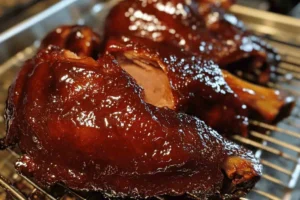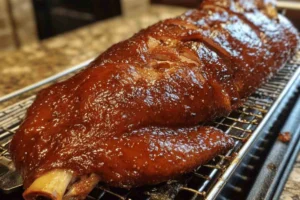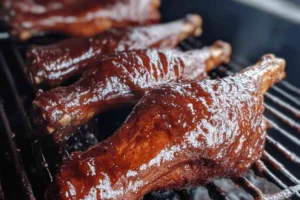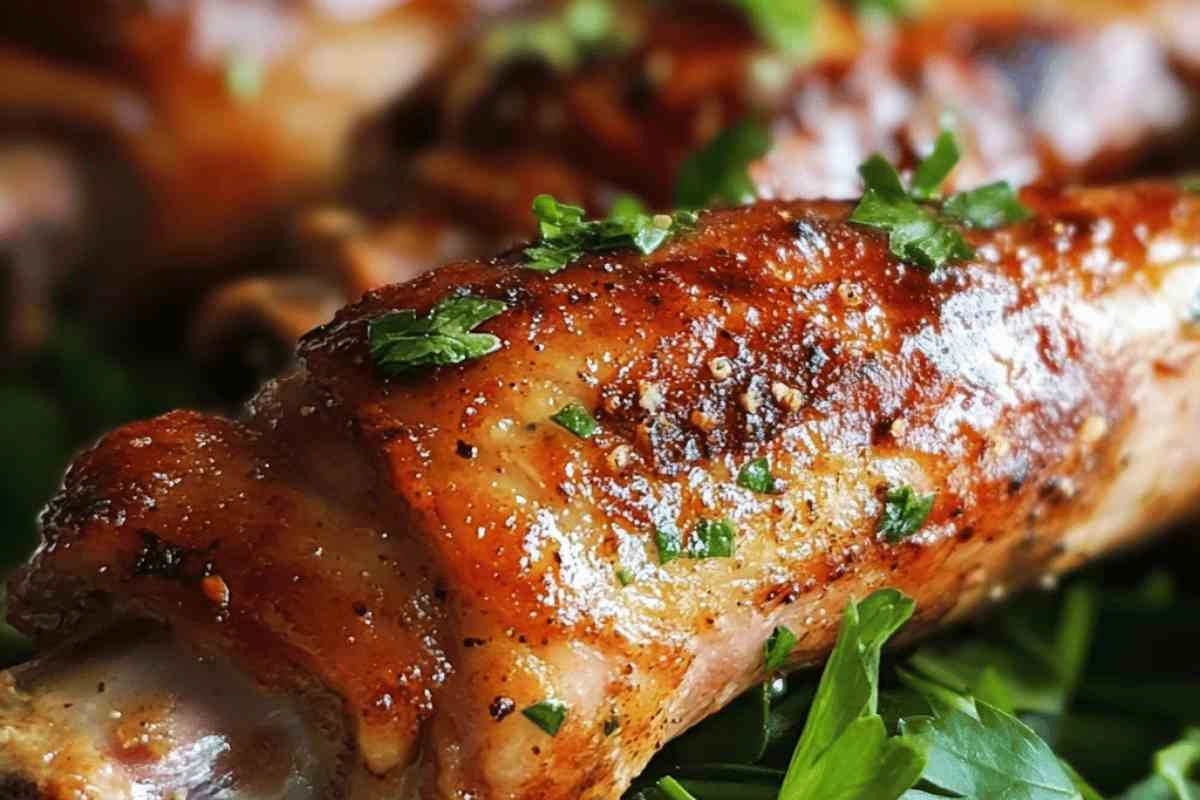If you’ve ever had tough smoked turkey wings, you’re not alone. Many home cooks face this issue. It’s important to know why this happens to make your wings tender and tasty.
The texture of turkey wings can get tough due to cooking methods and temperature. This article will explain why your wings might be tough. It will also give you tips to make them juicy and tender.

Understanding Turkey Wings and Their Texture
Turkey wings have three parts: drumettes, wingettes, and wingtips. Each part needs different cooking requirements to get the right texture. Drumettes are the biggest and most meaty, making them great for smoking. Wingettes have less meat and need careful cooking to stay tender.
When you buy turkey wings, you usually get one to two pieces per pound. Cooking them right is key. To keep them moist, cover them with foil while baking. Make sure to use a food thermometer to check if they’re cooked to 165 degrees Fahrenheit.
- Drumettes: Meaty and tender, best for smoking.
- Wingettes: Require careful cooking to prevent toughness.
- Wingtips: Less commonly used in recipes.
To improve your turkey wing experience, clean them with vinegar or citrus. This adds flavor and keeps them clean. Also, mix juice and cornstarch to thicken sauces without losing taste. Knowing about turkey wings and their texture will help you make a delicious dish.
| Turkey Wing Segment | Texture | Cooking Method |
|---|---|---|
| Drumettes | Meaty and tender | Best for smoking or roasting |
| Wingettes | Lean, prone to toughness | Requires careful attention |
| Wingtips | Less meat, bony | Often used for stocks or broths |
Common Causes of Tough Smoked Turkey Wings
Tough smoked turkey wings can come from several causes of tough turkey wings. Cooking them too low, below 225°F, doesn’t break down collagen well. This makes the wings chewy. On the other hand, cooking them too high, above 350°F, dries them out. The meat loses moisture, making it stringy and tough.
Smoking turkey wings should happen between 275–325°F. This range helps cook them evenly, making them tender. Fresh turkey wings are better than frozen ones. Frozen wings can lose moisture, making them tougher. Younger turkeys are also better for smoking because their meat is tender.
Brining the wings for 12-24 hours in saltwater helps keep them moist. Marinating in acidic ingredients like lemon juice or vinegar tenderizes the wings. Keeping an eye on the smoker’s temperature and using a water pan helps keep the wings juicy.
By using these methods, you can make sure your smoked turkey wings are tender and delicious.
| Cooking Methods | Temperature Range | Effect on Texture |
|---|---|---|
| Smoking | 225°F | Tough and chewy |
| Smoking | 275–325°F | Tender and juicy |
| Smoking | 350°F+ | Dry and stringy |
Why are my smoked turkey wings tough?
When you smoke turkey wings, they might turn out tough. It’s important to know how overcooking and undercooking affect their texture. This knowledge helps you get the perfect wings.
Overcooking and Its Effects
Overcooking makes turkey wings dry and unappetizing. High heat for too long dries out the meat, making it tough and stringy. To keep them tender, cook them to 170°F.
Don’t cook them too long at high temperatures. This can ruin their texture. It’s key to avoid overcooking for a great meal.
Undercooking: A Risk of Toughness
Undercooking can also make turkey wings tough. The meat’s proteins don’t break down well, leading to a rubbery texture. They need to reach at least 165°F for tenderness.
It’s crucial to find the right balance between undercooking and overcooking. Watching the cooking process closely helps avoid tough wings.
Importance of Brining for Tenderness
Brining is key to making your turkey wings tender. The importance of brining is huge, especially for juicy smoked turkey wings. Soaking the wings in saltwater lets them soak up moisture and flavors.
This makes every bite full of taste and juiciness.
When brining turkey wings, you use a wet brine with water and kosher salt. A good mix is 1 gallon of water with 1 cup of kosher salt. This keeps the wings moist during cooking, making them more tender.
It’s best to brine for at least 12 hours. But longer brining can make them even better.

Brining and cooking together tenderize smoked turkey wings. Wet brined wings are juicier than unbrined ones. The salt breaks down the meat’s protein, keeping it moist.
Brining also lets flavors go deeper into the meat. This makes your smoked turkey wings taste better.
Drying the Skin Before Smoking
Drying the skin of your turkey wings is key for a great smoking experience. After brining, pat the wings dry and refrigerate them for hours. This step helps remove excess moisture, leading to better skin texture.
A dry skin ensures a crispy finish, boosting the flavor and enjoyment of your dish. Tenderizing turkey wings starts with focusing on the skin. Wet skin can result in tough wings once smoked.
The high heat in smoking pulls moisture from the skin quickly. This can make the skin tough and leather-like. Using effective drying techniques can solve this problem.
To get the best results, dry the turkey wings skin for at least a couple of hours before smoking. This step greatly reduces the risk of tough skin, making your dish better.
| Technique | Time Required | Benefits |
|---|---|---|
| Pat Dry After Brining | 10-15 minutes | Removes excess moisture |
| Refrigeration Rest | 2-24 hours | Crispier skin texture |
| Rub with Salt | Overnight | Enhances flavor, promotes moisture retention |
Cooking Temperature and Its Impact
The cooking temperature is key to tender smoked turkey wings. The right temperature makes a big difference in your meal’s quality. Cooking at higher temperatures makes the meat juicier and tastier.
Lower temperatures can make the meat tough. It’s better to start slow and then increase the heat. The USDA says to cook turkey to 165°F (74°C) for safety and tenderness.
Not watching the temperature can lead to mistakes. These mistakes make the meat tough. A MeatStick wireless meat thermometer helps avoid these problems. Let the turkey rest for 20-30 minutes to make it even more tender.

| Cooking Temperature | Effect on Turkey Wings |
|---|---|
| 225°F (107°C) | Tender, rubbery texture; good for slow smoking |
| 300°F (149°C) | Optimal for rendering fat, juicy wings |
| 350°F (177°C) | Can dry out wings if overcooked |
Start with low heat and finish with high. This way, you get a crispy outside and juicy inside. Finding this balance is crucial for great smoked turkey wings.
How to Make Smoked Turkey Wings Tender
To make smoked turkey wings tender, you need to focus on the right smoking techniques and flavoring. A few key strategies can greatly improve the texture and taste of your wings.
Tips for Proper Smoking Techniques
Here are some tips to make your turkey wings tender:
- Start with a low temperature to cook the wings evenly.
- Then, increase the temperature briefly to crisp the skin. This adds a nice contrast to the soft meat inside.
- Make sure the wings reach an internal temperature of 175-180°F. This ensures they are cooked well without drying out.
- Keep an eye on the smoking time. Aim for at least 30 minutes but no more than 3 hours, depending on your equipment and desired tenderness.
Using Marinades and Spices
Marinades can greatly improve the flavor and tenderness of your wings. They help keep the meat moist and add to the taste. Here are some tips:
- Use a marinade with vinegar or citrus juice to break down proteins and make the wings tender.
- Add spices like garlic powder and paprika for extra flavor. The right mix of spices can really enhance your wings.
- Let the wings marinate for at least a few hours or even overnight. This allows the flavors to fully penetrate the meat.
By using these techniques and flavorful marinades, you can turn your smoked turkey wings into a tender and delicious dish. It’s sure to please everyone’s taste buds.
| Smoking Technique | Internal Temperature | Marinade Tip |
|---|---|---|
| Low and Slow | 175-180°F | Include vinegar or citrus juice |
| Increase Temperature for Crisping | Avoid exceeding 180°F | Use spices like garlic powder and paprika |
| Minimum Smoking Time | 30 Minutes | Marinate for several hours |
Additional Tips for Tender Smoked Turkey Wings
To get the best results with your smoked turkey wings, try these tips.
- Use both direct and indirect heat when smoking. This helps cook evenly and avoids tough spots.
- Wrap the wings in foil halfway through cooking. This keeps moisture in and makes the meat tender.
- Let the wings rest after cooking. This lets juices spread out, keeping the meat moist when you cut it.
- Keep the cooking temperature between 225°F to 250°F. This slow cooking breaks down tough tissues.
For the best results, check the internal temperature with a meat thermometer. Make sure it hits 165°F at the thickest part. This is key for safety and tenderness.
| Wing Size | Cooking Time (Hours) | Temperature (°F) |
|---|---|---|
| Small | 1.5 – 2 | 225 – 250 |
| Medium | 2 – 2.5 | 225 – 250 |
| Large | 2.5 – 3 | 225 – 250 |
Softening tough turkey wings takes patience and careful attention. By using these techniques, you’ll improve your smoking skills. You’ll enjoy delicious, tender wings at your next event.
Conclusion
Learning what makes smoked turkey wings tough can really improve your cooking. Using methods like brining helps make the wings tender and juicy. Brining for 12-24 hours in the fridge gets the meat ready for a better texture and taste.
It’s also key to keep your smoking temperature in check. Aim for 225°F to 250°F to ensure the wings reach 165°F. This helps them stay tender. Letting the wings rest for 30 minutes after smoking is crucial. It helps keep them moist and flavorful.
By using these tips, your meals can become unforgettable. Perfectly smoked turkey wings make any gathering special. A well-cooked dish not only feeds but also enhances the dining experience.
FAQs About Tough and Rubbery Smoked Turkey Wings
1. Why are my smoked wings tough?
Smoked wings can turn out tough if they are overcooked, cooked at too high a temperature, or not given enough time to tenderize. Smoking meat slowly at a low temperature helps break down collagen and connective tissues, resulting in tender wings. Additionally, skipping a brine or marinade can leave the wings dry and less flavorful, contributing to a tough texture.
2. Why is smoked turkey so tough?
Smoked turkey can be tough if it’s not cooked low and slow. High heat can cause the muscle fibers to contract, making the meat dense and chewy. Failing to properly prepare the turkey, such as skipping brining or not letting the meat rest after cooking, can also lead to toughness. Resting allows the juices to redistribute, resulting in a more tender and moist turkey.
3. Why are my turkey wings tough?
Turkey wings are naturally rich in connective tissue, so they require slow and steady cooking to become tender. If your turkey wings are tough, they were likely undercooked or cooked too quickly at a high temperature. Using a braising method or smoking them slowly at a low temperature can help break down the connective tissues for a more tender result.
4. Why is my smoked turkey rubbery?
A rubbery texture in smoked turkey often results from cooking at too low a temperature without sufficient time for collagen to break down. The skin can also become rubbery if the smoker’s temperature is too low to render the fat properly. For better results, aim for a smoker temperature of around 225–250°F, and consider finishing the turkey in an oven or broiler to crisp the skin.
Let me know if you’d like more detailed explanations or additional tips!

